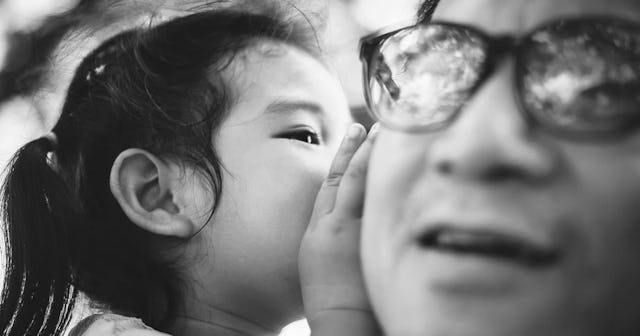It's Never Okay To Ask A Child To Keep A Secret

We were hosting a playdate at our house with several moms and young kids. Surrounded by dress-up clothing and our coffee cups, we chatted for hours, pausing to grab the kids snacks or wipe their noses. At one point, the kids were having a pretend tea party. My friend smiled, leaning toward my preschooler’s ear, and asked, “Can I tell you a secret?” She proceeded to make quiet whooshing noises in my child’s ear, making my child giggle in delight.
Of course, they were simply joking around, enjoying some adult-child play. Yet, I couldn’t seem to get past the fact that my friend had implied that secrets were silly, safe, and appropriate—part of a normal adult-kid interaction.
RELATED: The Modern Parent’s Guide To Internet Safety For Kids
When my siblings and I were children, my mom well-prepared us for “stranger danger”—as it was known as in the 1980s. We had a code-phrase that any adult had to state before they were allowed to pick us up from school in case my mom couldn’t. We were told our bodies belonged to us. If any adult ever urged us to keep a secret, we should always tell our parents. My mom also let us know that we would never get in trouble for telling the truth.
Are secrets a big deal? Well, yes and no. Sometimes what a person frames as a secret really isn’t anything shameful, private, or inappropriate. Often, it’s just child-drama or adult-gossip. However, I can’t count on my children to understand the difference—especially not my younger kids who have not yet developed the maturity to discern what’s what.
Monica Fecke/Getty
I’ve taught my four kids since they were quite young that secrets aren’t OK. This is especially true of adults telling them to “keep a secret” or asking, “Is my secret safe with you?” An adult should never tell a child anything that should be kept hush-hush—like ever. However, this also extends to their peers dishing private information that they might insist my child never tell another soul.
In middle school, one of my best friends told me a secret. The summer before, her stepdad was cuddling her under a blanket on her living room sofa, repeatedly slipping his hands just inside her waistband and close to her budding breasts. She told me it made her uncomfortable, but she didn’t want to tell her mom. After all, what if she got into trouble? Maybe he was just being friendly? I didn’t know then that there was a term and definition for this–sexual abuse.
Secrecy always burdens the victim–and the person who learns of the secret and is sworn to keep it on the down-low, sometimes indefinitely. In my case, I decided not to tell my parents—uncertain of what they would do in response—and I regret that decision, to this day. Because of this important incident, I have warned my children that if someone feels the need to tell them information and begs them not to share, that’s a red flag. It’s definitely something that needs to be entrusted to a safe adult.
Granted, there is a word I do allow my family to use, and that word is “surprise.” For example, when we were throwing a relative a surprise 60th birthday party. That was a lovely gesture that we didn’t want to ruin by accidentally spilling the beans to the relative. The “surprise” was OK because it came from Mom and Dad—two safe people—and it was something happy. Another surprise would be knowing what’s inside a wrapped gift under the Christmas tree, and making the conscious decision not to ruin the surprise by telling the receiver. Gathering donations to present to someone who has faced a tragedy is another appropriate surprise.
Siri Stafford/Getty
However, we have warned our kids that surprises are few and far between. There are only a handful of circumstances in which a surprise happens. Most other keep-it-to-yourself vows are involving something that a trusted adult definitely needs to know about—ASAP.
More than ever, it’s important to teach our children about consent, about stranger awareness, including sex trafficking and about video-gaming and social media safety. Because of the anonymity, someone can present themselves as anyone they wish—a terrifying reality.
Among these essential conversations, we have to include explaining the difference between a secret and a surprise. The discussion needs to move away from fear and shame, and parents should emphasize the importance of safety—including emotional safety—above all else.
Our kids know that no matter how much someone begs them to keep information quiet—or threatens to retaliate if they share—it is their responsibility to tell us so we can help them navigate the next step. Depending on what it is, we might do nothing. We might need more information. Or, the secret could turn out to be quite serious and require adults to take charge. There are many possibilities—none of which involve children being faulted or disciplined for telling.
I know some parents feel this is over-the-top. However, I am going to defer to the idea that it’s better to be safe than sorry. What’s the harm in me knowing a “secret” that’s just child ridiculousness or a minor infraction that doesn’t warrant a response? I’d much rather be the trustworthy, mama-don’t-play parent than the clueless one.
This article was originally published on